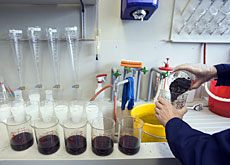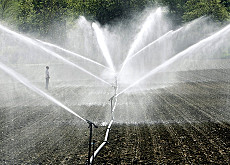Swiss to use ozone to clean waters

A pilot study is set to combat a new enemy of Switzerland's lakes and rivers: micro-contamination.
While water quality has improved progressively over the past three decades, the situation has stabilised. The Federal Environment Office, which is behind the initiative, will now use ozone to purify Swiss waters.
Micro-contamination is caused by minute traces of so-called organic elements such as herbicides, cleaning materials and medicines.
These are to be found in very low concentrations in water, from a billionth (nanogram) to a millionth (microgram) of a gram per litre.
A nanogram of contamination is the equivalent of a headache pill dissolved in a 25-metre long swimming pool, according to the Federal Environment Office.
The pilot project – at Regensdorf near Zurich – seeks to minimise micro-contamination passing from water used in residential areas into lakes and rivers.
A special technique involving ozone will be administered in addition to other purification methods, Alberto Bianchi, head of the water protection agency in canton Ticino, told swissinfo.
Liquid oxygen or O2 is converted into ozone or O3. “This is then added to sewage water, which enables the removal of micro-contaminants,” Bianchi explained.
Challenges
Current sewage plants are geared towards eliminating nitrates and phosphates, which cause rapid growth in algae and water plants, which in turn use up oxygen reserves in the water.
These plants are unable to eliminate micro-contaminants completely.
However, combating micro-contamination is not only a technical problem. Sometimes, certain substances are found in surprisingly high concentrations. This is true of medicines, which are often used unnecessarily.
“The real challenge lies in consuming such products sensibly,” stressed Bianchi. “Medicine should only be taken if it is absolutely necessary.”
swissinfo
The Regensdorf project starts in 2007 and will last 18 months.
It is part of a nationwide initiative called “Strategy MicroPoll”.
The Federal Environment Office will partner institutions such as the Federal Institute of Technology in Zurich to carry out the research.
Urbanisation over the past decades in Switzerland has led to various negative consequences for lakes and rivers.
The situation became critical in the 1960s, but then environmental awareness led to different measures being introduced, particularly from the 1990s, that made marked improvements to the water quality. The situation has now stabilised at a good level.
One of the main contributing factors has been heavy investment in the area of sewage treatment plants. But big challenges are said to lie ahead in keeping water clean.

In compliance with the JTI standards
More: SWI swissinfo.ch certified by the Journalism Trust Initiative



You can find an overview of ongoing debates with our journalists here. Please join us!
If you want to start a conversation about a topic raised in this article or want to report factual errors, email us at english@swissinfo.ch.